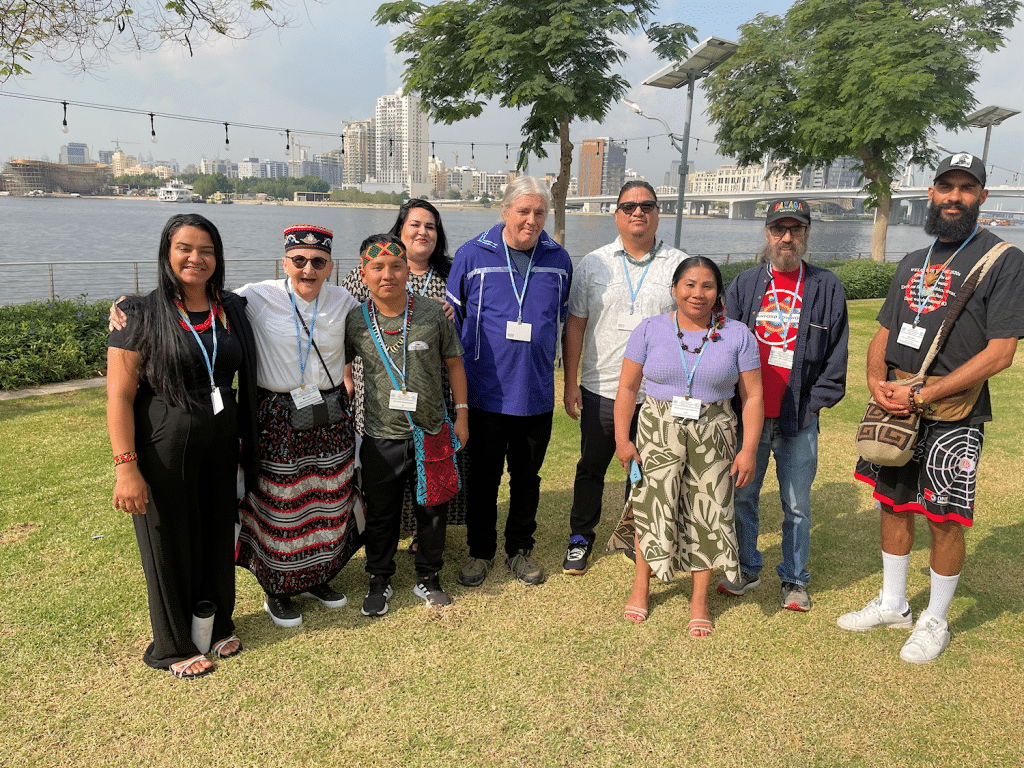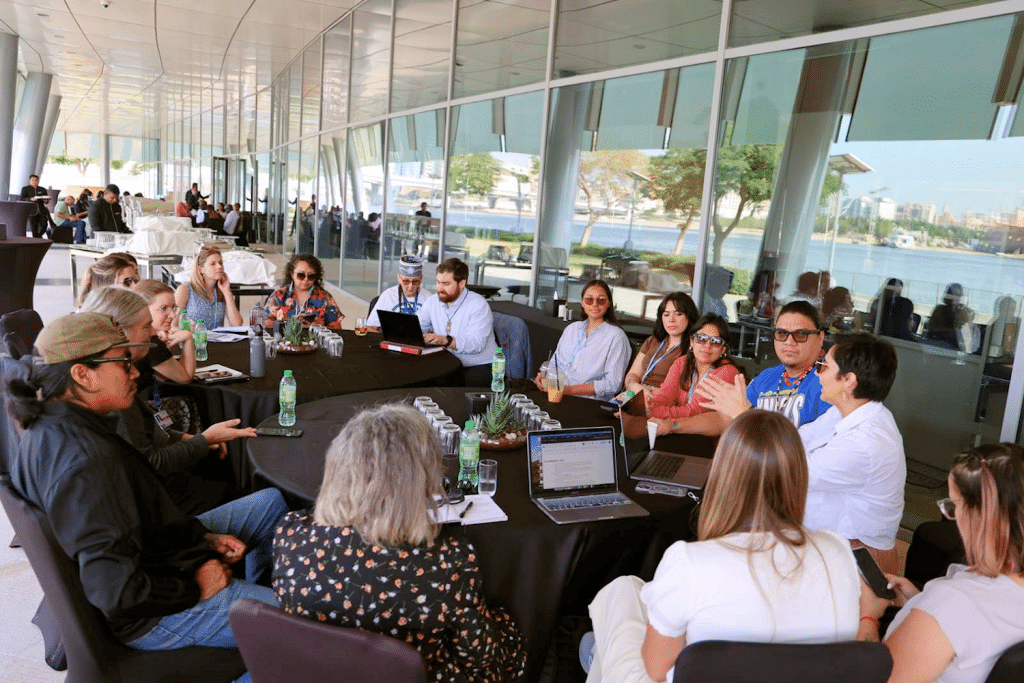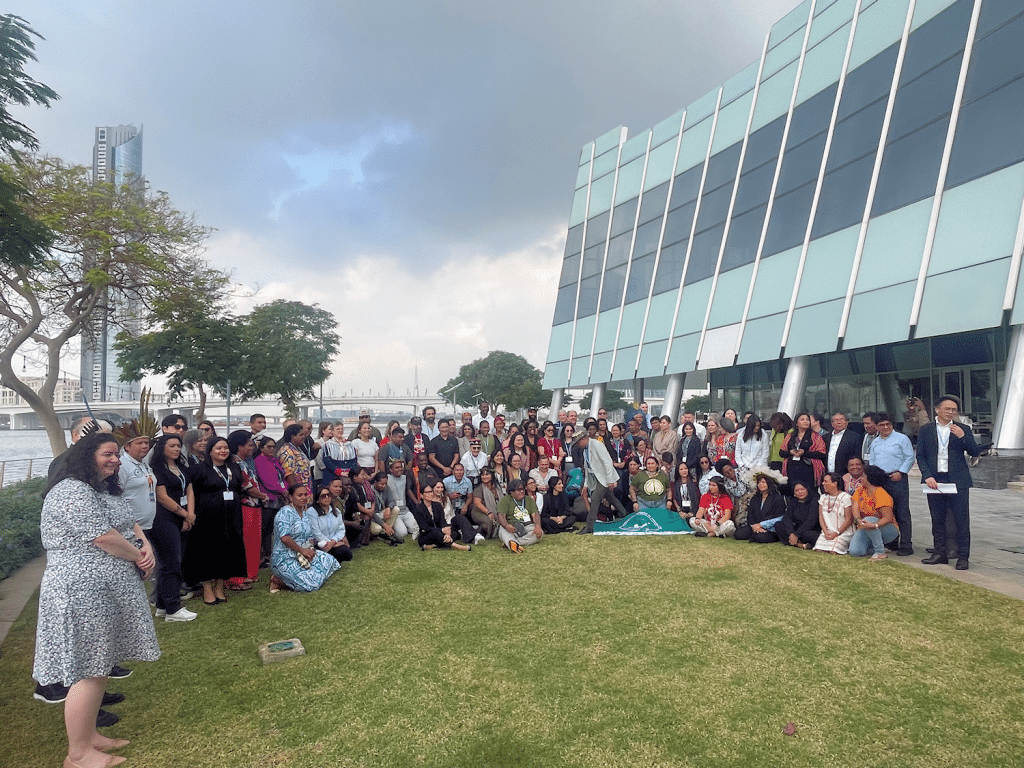
Members of the Indigenous Environmental Network’s COP28 delegation that participated in the Local Communities and Indigenous Peoples Platform 10th meeting of the Facilitative Working Group in Dubai, UAE.
Tuesday, November 28, 2023, concluded the fourth and final day of the United Nations Framework Convention on Climate Change (UNFCCC) Local Communities and Indigenous Peoples Platform (LCIPP) 10th meeting of the Facilitative Working Group in Dubai, UAE. The Facilitative Working Group (FWG) of the LCIPP is a constituted body that was developed at COP24 in 2018 to further operationalize the platform and facilitate the implementation of its three functions which include knowledge, capacity for engagement, and climate change policies and actions.
The FWG has 14 members, half of which are parties (nation states) and half Indigenous representatives from the seven UN Indigenous sociocultural regions of the world. During the #FWG10, a variety of items were discussed including: the review of the progress of the FWG9 decisions; LCIPP regional gatherings report backs; a discussion on the second three-year workplan, regions met and developed a draft of the third three-year workplan, and other relevant bodies shared updates, aspirations and report backs; and more.


Members of our IEN COP28 delegation participated in the FWG10 meeting, with active participation in the North America, Latin America, and Pacific breakout discussions. Our delegation emphasized the importance of instituting an Ethical Protocol for the Protection and Use of Traditional Indigenous Knowledge. Our delegation underscored that our Indigenous Knowledge shall be in an equitable position in relation to Eurocentric science. We provided tangible ethical guidelines for how UNFCCC processes can safeguard and protect the use of Traditional Indigenous Knowledge! Read more about IEN’s official submission regarding Ethical Protocol to the UNFCCC Local Communities and Indigenous Peoples Platform’s Facilitative Working Group. If the FWG agrees to include the ethical protocol in its third three-year workplan, upon implementation, it would then be elevated to the Subsidiary Body for Scientific and Technological Advice (SBSTA). Upon SBSTA’s acceptance, it would be elevated to the Conference of Parties States.
IEN’s Indigenous Sovereignty Advocate, Michael Lane (Menominee) shared, “IEN is advocating for the Ethical Protocol on the Protection and Use of Traditional Indigenous Knowledge because for far too long our knowledge has been extracted and used by non Indigenous interests in their frameworks. Traditional Indigenous Knowledge needs to stand in an equitable way with Eurocentric science with the same status, and the Knowledge Holders need to be able to carry it forward through the UN processes.”
In the days ahead, the LCIPP will be hosting its Third Annual Gathering of Knowledge Holders – an exchange amongst [Indigenous] Knowledge Holders which two esteemed members of the Indigenous Environmental Network delegation will participate in: IEN [and IITC] Board member Faith Gemmill (Neets’aii Gwich’in, Pit River and Wintu) and long-time network member, Great Grandmother Mary Lyons (Leech Lake Band of Ojibwe).
These annual gatherings of the LCIPP bring together Knowledge Holders to share and promote adaptation actions that are based on and guided by the best available science, including Traditional Knowledge, knowledge of Indigenous Peoples, and local knowledge systems in accordance with Article 7 of the Paris Agreement. This year’s thematic focus for the Third Annual Gathering of Knowledge Holders will be on the nexus of water, energy, and food.
Follow IEN’s social media to stay up to date on what is happening on the ground in Dubai during the UNFCCC COP28 on Facebook, Twitter, Instagram, TikTok, and Youtube
###
#COP28UAE #UNFCCC #LCIPP #ProtectTraditionalIndigenousKnowledge #EthicalProtocol